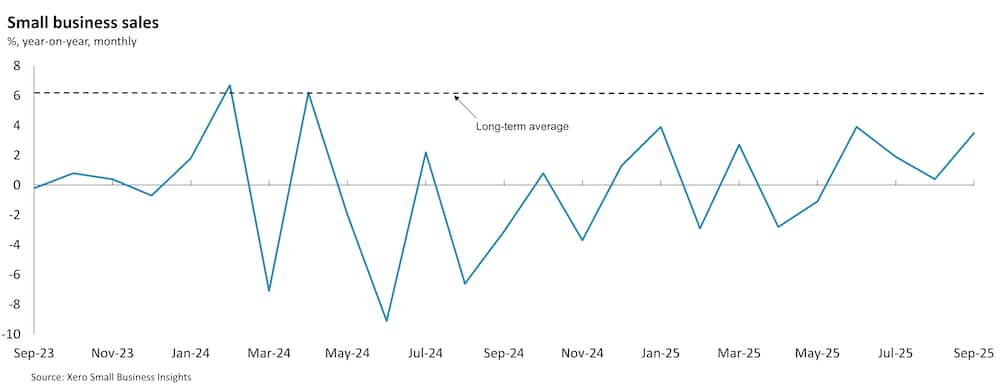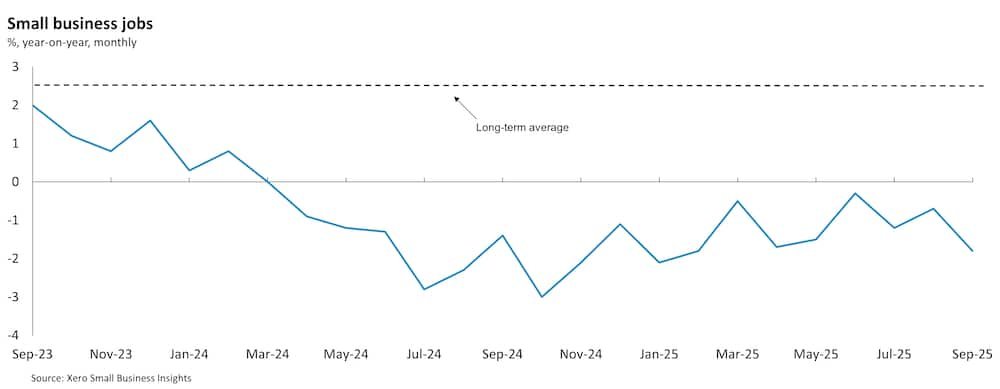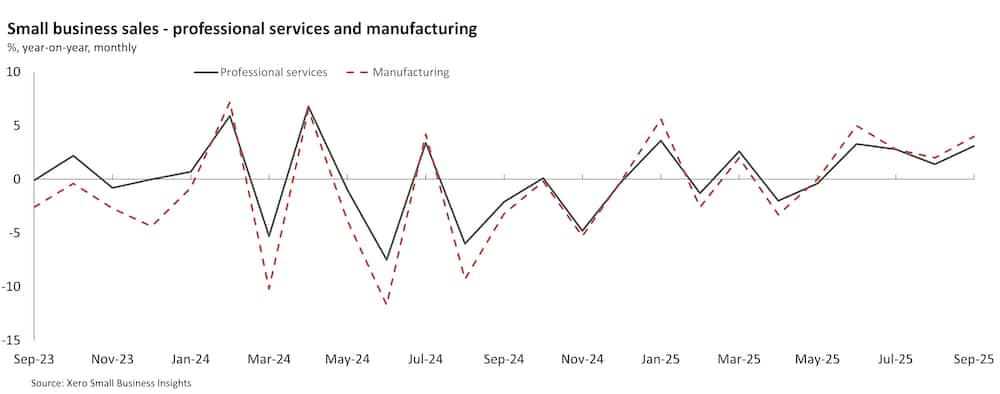New Zealand Small Business Insights
This analysis focuses on core performance metrics of sales growth, jobs growth, wages growth, and time to be paid.


Sales growth patchy but gradually returning
Published: 30 October 2025
The latest Xero Small Business Insights (XSBI) data for New Zealand shows small businesses continue to struggle. There are still fewer jobs in small businesses than a year ago, as has been the case for 18 months. Sales rose in the quarter, recording the best result in two-and-half years. Even so, this increase was only 1.9% y/y so it was still a decline in inflation-adjusted (real) terms. Overall, it is a positive sign that nominal sales have started to grow again but conditions remain challenging for New Zealand small businesses.
Sales in small businesses rose 1.9% year-on-year (y/y) in the September quarter, after being flat in the June quarter. Normally such a result would be considered soft but it is the best result since the June quarter 2023, which illustrates just how difficult the trading environment has been in recent years. The last four months all showed positive sales growth, which is the longest consecutive run of sales growth since mid-2023.
The Reserve Bank of New Zealand (RBNZ) has been trying to reinvigorate the economy by cutting interest rates by 300 basis points since August 2024, which is one of the largest cuts in interest rates by major central banks this cycle. The latest cut, in October, was an oversized 50 bps and took the official cash rate down to 2.5%. The monthly sales pattern shows a spike in sales immediately after the 25 bps cut in August (sales grew 3.5% y/y in September). We will need to see more data to understand if this is sustained.
The XSBI data is consistent with the RBNZ's media release following its October meeting, which noted that economic activity was weak in New Zealand in mid-2025. The RBNZ also said household consumption is recovering, in response to lower interest rates. The XSBI data suggests some of this extra spending is gradually flowing through to small businesses. However, more is clearly needed in the upcoming critical summer and holiday period.

The latest XSBI data shows that by historical standards, the New Zealand economy is still weak. However, there are tentative signs of some improvements, albeit gradual only.
XSBI NZ July 2025 - September 2025 data
Jobs in small businesses were 1.2% lower than a year ago in the September quarter, after a similar fall in the June quarter. In terms of monthly data, there have been 18 consecutive months where jobs are lower than they were the year before. At least the decline in jobs is gradually getting smaller, although the 1.8% y/y fall in September went against this improving trend.
Not all small businesses are cutting their workforces. The share of small businesses growing their workforce increased slightly in the quarter, to 28.0% from 27.8% in the June quarter. Unfortunately, this was offset by a rise in the share of small businesses reducing the size of their workforce, at 29.7% compared to 29.5% in the June quarter.
The XSBI jobs data is consistent with general employment weakness across the New Zealand economy. According to the latest data from Stats NZ (June quarter), employment fell 0.9% y/y.

Regional data showed sales growth is patchy. The major cities of Auckland and Wellington have been a drag on economic growth since early 2024. In the September quarter both finally recorded a rise in sales, +0.6% y/y and +0.4% y/y respectively. This improvement wasn't evident in the jobs data, however, likely due to the lagged nature of employment. Auckland had a 2.5% y/y fall in jobs (same as the June quarter) and Wellington had a 4.5% y/y fall (after a 3.5% y/y fall in the June quarter). In contrast, Canterbury (+4.3% y/y) and Otago (+6.3% y/y) continued to be the two best performing regions for sales. Canterbury (+1.0% y/y) was also the only region to have positive jobs growth in the September quarter. Otago jobs were the same as the September quarter last year.
Industry data shows the improvement in sales was not broad-based. The star industry performer of late has been agriculture, recording double digit growth for three consecutive quarters. But this didn't continue in the September quarter, with sales growing only 3.3% y/y. This is a concern as this industry has been one of the few bright spots in the New Zealand economy. The solid sales performance earlier in the year has supported jobs, however, which were up 0.8% y/y - one of only three industries XSBI tracks to record positive jobs growth in the September quarter. Manufacturing and professional services are overall the two best performing sectors so far in 2025. They have been able to record at least three consecutive quarters of positive sales and jobs growth - something that has eluded other industries that XSBI tracks. In other industries in the September quarter, real estate services (+4.1% y/y) and other services (+1.3% y/y) have recorded solid sales outcomes but this didn't translate into jobs growth, which fell 1.2% y/y and 3.5% y/y respectively. Construction remains soft, with sales down 0.7% y/y in the September quarter. This is the eighth consecutive quarterly decline. Construction jobs have been lower than a year ago for seven consecutive quarters - down 3.9% y/y in the latest quarter.

Overall, the latest XSBI data shows that by historical standards, the New Zealand economy is still weak. However, there are tentative signs of some improvements, albeit gradual only. More data is needed to have confidence that this is a sustainable trend and bigger improvements are needed before there is a meaningful impact on small businesses. This data is a great reminder to everyone about the importance of supporting local small businesses when considering purchases, especially over the crucial summer and holiday months that are so important for many consumer-facing small businesses.
For more information on the XSBI metrics, see our methodology page.
Note on XSBI jobs metric
The COVID-19 pandemic caused significant volatility in many datasets, including XSBI. To account for this the XSBI jobs data series previously had a 'COVID-19 adjustment' made to it. Sufficient time has now passed since the end of the pandemic period to remove this temporary adjustment. As a result, historical XSBI jobs growth data has been subjected to larger than usual revisions in this latest publication.
Disclaimer
This report was prepared using Xero Small Business Insights data and publicly available data for the purpose of informing and developing policies to support small businesses.
This report includes and is in parts based on assumptions or estimates. It contains general information only and should not be taken as taxation, financial, investment or legal advice. Xero recommends that readers always obtain specific and detailed professional advice about any business decision.
The insights in this report were created from the data that was available as at the date it was extracted. Data used was anonymised and aggregated to ensure individual businesses can not be identified.
Contact us about Xero Small Business Insights
Arming small business owners with simple but powerful insights. If you have any questions, reach out to us.